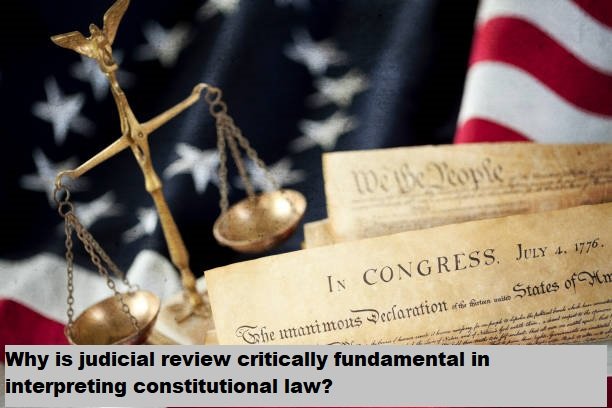Introduction:
In this article, we embark on a profound exploration of the pivotal role that judicial review plays in the interpretation of constitutional law. Judicial review stands as a cornerstone, wielding immense influence in shaping the application and understanding of constitutional principles. By empowering courts to assess the compatibility of laws and governmental actions with the constitution, judicial review ensures adherence to the foundational values enshrined within. This critical function grants the judiciary the authority to safeguard individual rights, check governmental overreach, and maintain the delicate balance between powers. Through landmark cases and nuanced interpretations, judicial review remains a linchpin in upholding the rule of law and preserving the integrity of constitutional frameworks worldwide.
- Ensures constitutional compliance: Upholding legal alignment with foundational principles.
- Safeguards individual rights: Protecting liberties from governmental encroachment or overreach.
- Maintains checks and balances: Balancing power among branches for accountability.
- Sets legal precedents: Establishing guiding principles for future constitutional interpretations.
- Resolves legal disputes: Providing authoritative resolutions within constitutional bounds.
- Adapts to societal changes: Interpreting law to address evolving societal norms and values.
Ensures constitutional compliance: Upholding legal alignment with foundational principles.
Judicial review stands as the vanguard of constitutional compliance, ensuring that all laws and governmental actions align with the bedrock principles enshrined within a nation’s constitution. This process involves evaluating the legality and constitutionality of laws passed by legislatures or actions taken by the executive branch. By scrutinizing these against constitutional tenets, courts ensure that the enacted laws or governmental actions do not violate the rights or provisions outlined within the constitution. This alignment with foundational principles not only reinforces the rule of law but also serves as a bulwark against potential deviations from the essence of constitutional frameworks, thereby safeguarding the integrity and legitimacy of the legal system.
Safeguards individual rights: Protecting liberties from governmental encroachment or overreach.
Judicial review serves as a guardian of individual liberties by scrutinizing laws or actions that might encroach upon these rights. Through this process, courts protect citizens from overreach by the government, ensuring that laws do not impinge upon fundamental rights such as freedom of speech, religion, privacy, or due process. Landmark cases like Roe v. Wade in the United States or Kesavananda Bharati v. State of Kerala in India exemplify how judicial review safeguards individual rights by striking down laws that infringe upon these rights. This critical role of protecting liberties underscores the significance of judicial review in upholding the rights and freedoms of citizens within the confines of the constitution.
Maintains checks and balances: Balancing power among branches for accountability.
The concept of checks and balances is intricately woven into the fabric of judicial review. By evaluating the constitutionality of laws and actions, courts act as a check on the legislative and executive branches. This process prevents any single branch from overstepping its authority, fostering a system of accountability among branches of government. For instance, if a law passed by the legislature or an executive action is found to exceed the scope of their constitutional powers, the judiciary intervenes, maintaining a delicate balance that prevents the concentration of power within any one branch. This interplay ensures that each branch operates within its designated constitutional boundaries, preserving the equilibrium necessary for effective governance.
Sets legal precedents: Establishing guiding principles for future constitutional interpretations.
Through its rulings, judicial review establishes legal precedents that serve as guiding lights for future interpretations of constitutional law. Landmark cases create a jurisprudential framework, offering insights and interpretations that shape subsequent legal discourse. These precedents contribute to the coherence and consistency of constitutional interpretation, providing a roadmap for courts to navigate similar cases in the future. As these precedents accumulate, they form the basis for the evolution of legal principles, contributing significantly to the stability and predictability of constitutional law interpretations.
Resolves legal disputes: Providing authoritative resolutions within constitutional bounds.
Judicial review serves as the authoritative forum for resolving legal disputes within the boundaries set by the constitution. When conflicting interpretations or disputes arise concerning constitutional matters, courts intervene to provide definitive rulings. This resolution helps in maintaining legal certainty, ensuring that disputes are settled in adherence to constitutional provisions. The courts’ authority to interpret the constitution and provide authoritative judgments remains a cornerstone in maintaining the legitimacy and functionality of legal systems.
Adapts to societal changes: Interpreting law to address evolving societal norms and values.
In interpreting constitutional law, judicial review adapts to the dynamic nature of society, allowing for the evolution of legal interpretations to align with shifting societal norms and values. As society progresses and evolves, the judiciary’s role in interpreting the constitution becomes crucial in applying foundational principles to contemporary issues. This adaptability ensures that constitutional law remains relevant and responsive to the changing needs and values of the populace, reflecting the ethos of the times while staying true to the constitutional framework.
Judicial review, through its multifaceted roles, stands as a linchpin in interpreting constitutional law, offering a robust mechanism for ensuring compliance, protecting rights, maintaining a system of checks and balances, setting legal precedents, resolving disputes, and adapting to societal changes, thereby upholding the essence and integrity of constitutional frameworks worldwide.
Conclusion:
I hope this exploration into the critical role of judicial review in interpreting constitutional law underscores its profound significance. From ensuring constitutional compliance to safeguarding individual rights and maintaining a system of checks and balances, judicial review stands as the linchpin of a robust legal system. By setting legal precedents, resolving disputes authoritatively, and adapting to societal changes, it upholds the integrity and relevance of constitutional frameworks. The judiciary’s pivotal role in interpreting and applying constitutional principles not only guarantees adherence to foundational values but also ensures the evolution and adaptation of laws to meet the needs of dynamic societies. In essence, the centrality of judicial review resonates as a cornerstone in upholding the rule of law and preserving democratic ideals, fostering a fair and just society for generations to come.

